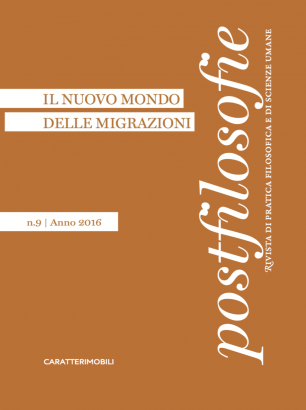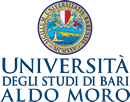Per una fenomenologia dello sradicamento: l’astrazione dei diritti umani tra Simone Weil e Hannah Arendt
DOI:
https://doi.org/10.15162/1827-5133/991Keywords:
Simone Weil, Hannah Arendt, sradicamento, diritti umani / Simone Weil, human rights, uprootingAbstract
Estraniazione, isolamento, superfluità sono le categorie tassonomiche di una complessa fenomenologia dello sradicamento che può essere ricostruita a partire dalle riflessioni di S. Weil e di H. Arendt. Se la prima nel considerare il “radicamento” un bisogno umano essenziale individua nel suo opposto la cifra distintiva della miserabile condizione degli esseri umani nel mondo contemporaneo, l’altra coglierà il nesso inestricabile tra sradicamento e razzismo derivato dal ripudio del «comune proposito di instaurare l’umanità sulla terra». Lo sradicamento, in questo saggio, riletto attraverso la doppia lente weiliana/arendtiana sia nella sua relazione essenziale con lo spazio che con il tempo, si rivela quella patologia che, nel fare astrazione dei diritti umani, dopo aver tragicamente attraversato il XX secolo appare ancora oggi, nelle sue forme odierne, come una minaccia per l’umanità.
Estrangement, isolation, superfluity are the taxonomic categories of a complex phenomenology of the uprooting that can be reconstructed starting from the reflections of S. Weil and H. Arendt. If the first, in considering "rooting" as an essential human need, identifies in its opposite the distinctive figure of the miserable condition of human beings in the contemporary world, the other will grasp the inextricable link between uprooting and racism derived from the repudiation of the "common purpose of establishing humanity on earth ". In this essay, uprooting, reread through the Weilian/Arendtian double lens both in its essential relationship with space and with time, reveals itself to be the pathology which, in doing abstraction of human rights, after having tragically crossed the twentieth century still appears today, in its present forms, as a threat to humanity.
References
ARENDT H., Tra passato e futuro, trad. it. Garzanti, Milano 1991.
– Le origini del totalitarismo, trad. it. Einaudi, Torino 2004.
FANON F., I dannati della terra, trad. it. Einaudi, Torino 2007.
FISTETTI F., Democrazia e diritti degli altri, Palomar, Bari 1992.
– Hannah Arendt e Martin Heidegger. Alle origini della filosofia occidentale, Editori Riuniti, Roma 1998.
FOUCAULT M., Che cos’è l’illuminismo?, Archivio Foucault. Interventi, colloqui, interviste (3. 1978-1985), trad. it. Feltrinelli, Milano 1998.
GAETA G., I “Cahiers”. Storia di un’opera postuma, A. Camus Quaderni, vol. I, trad. it. Adelphi, Milano 1982-1993.
HONNETH A., Lotta per il riconoscimento. Proposte per un’etica del conflitto, trad. it. Il Saggiatore, Milano 2003.
HUNT L., La forza dell’empatia. Una storia dei diritti dell’uomo, trad. it. Laterza, Roma-Bari 2007.
MATTUCCI N., La politica esemplare. Sul pensiero di Hannah Arendt, Franco Angeli, Milano 2012.
NIETZSCHE F., Così parlò Zarathustra, trad. it. Adelphi, Milano 1976.
RECCHIA LUCIANI F. R., Simone Weil. Tra filosofia ed esistenza, Pensa Multimedia, Lecce 2012.
TODOROV T., Di fronte all’estremo, trad. it. Garzanti, Milano 1992.
WEIL S., Riflessioni sulle cause della libertà e dell’oppressione sociale, trad. it. Adelphi, Milano 1983.
– La persona e il sacro, trad. it. ETS, Pisa 1990.
– La prima radice. Preludio ad una dichiarazione dei doveri verso l’essere umano, trad. it. SE, Milano 1990.
– I catari e la civiltà mediterranea, trad. it. Marietti, Genova 1996.
– Sul colonialismo. Verso un incontro tra Occidente e Oriente, trad. it. Medusa, Milano 2003.
Downloads
Published
Issue
Section
License
“Post-Filosofie” utilizza Open Journal Systems 2.4.8.5, che è un software open source per la gestione e la pubblicazione di riviste sviluppato, supportato e distribuito gratuitamente dal Public Knowledge Project sotto la GNU General Public License.
Gli autori che pubblicano su questa rivista accettano le seguenti condizioni:
- Gli autori mantengono i diritti sulla loro opera e cedono alla rivista il diritto di prima pubblicazione dell'opera, contemporaneamente licenziata sotto una Licenza Creative Commons - Attribuzione che permette ad altri di condividere l'opera indicando la paternità intellettuale e la prima pubblicazione su questa rivista.
- Gli autori possono aderire ad altri accordi di licenza non esclusiva per la distribuzione della versione dell'opera pubblicata (es. depositarla in un archivio istituzionale o pubblicarla in una monografia), a patto di indicare che la prima pubblicazione è avvenuta su questa rivista.
- Gli autori possono diffondere la loro opera online (es. in repository istituzionali o nel loro sito web) prima e durante il processo di submission, poichè può portare a scambi produttivi e aumentare le citazioni dell'opera pubblicata (Vedi The Effect of Open Access).
"Post-Filosofie" uses Open Journal Systems 2.4.8.5, which is an open source journal management and publication software developed, supported and distributed free of charge by the Public Knowledge Project under the GNU General Public License.
Authors publishing in this journal accept the following conditions:
- Authors retain the rights to their work and assign to the journal the right of first publication of the work, simultaneously licensed under a Creative Commons Licence - Attribution that allows others to share the work indicating intellectual authorship and first publication in this journal.
- Authors may enter into other non-exclusive licensing agreements to distribute the published version of the work (e.g., deposit it in an institutional repository or publish it in a monograph), as long as they indicate that the first publication was in this journal.
- Authors may disseminate their work online (e.g. in institutional repositories or on their website) before and during the submission process, as it may lead to productive exchanges and increase citations of the published work (See The Effect of Open Access).







